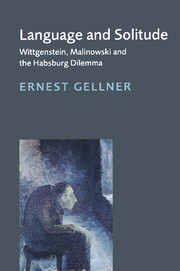Book contents
- Frontmatter
- Contents
- Preface
- Foreword
- Part I The Habsburg dilemma
- Part II Wittgenstein
- Part III Malinowski
- 23 The birth of modern social anthropology
- 24 The Malinowskian revolution
- 25 How did Malinowski get there?
- 26 Whither anthropology? Or: whither Bronislaw?
- 27 The difference between Cracow and Vienna
- 28 Malinowski's achievement and politics
- 29 Malinowski's theory of language
- 30 Malinowski's later mistake
- 31 The (un)originality of Malinowski and Wittgenstein
- Part IV Influences
- Part V Conclusions
- General bibliography
- Bibliographies of Ernest Gellner's writings on Wittgenstein, Malinowski, and nationalism
- Index
26 - Whither anthropology? Or: whither Bronislaw?
Published online by Cambridge University Press: 05 March 2010
- Frontmatter
- Contents
- Preface
- Foreword
- Part I The Habsburg dilemma
- Part II Wittgenstein
- Part III Malinowski
- 23 The birth of modern social anthropology
- 24 The Malinowskian revolution
- 25 How did Malinowski get there?
- 26 Whither anthropology? Or: whither Bronislaw?
- 27 The difference between Cracow and Vienna
- 28 Malinowski's achievement and politics
- 29 Malinowski's theory of language
- 30 Malinowski's later mistake
- 31 The (un)originality of Malinowski and Wittgenstein
- Part IV Influences
- Part V Conclusions
- General bibliography
- Bibliographies of Ernest Gellner's writings on Wittgenstein, Malinowski, and nationalism
- Index
Summary
Malinowski's early courses at the University in Cracow were at least as much in mathematics and natural sciences as in philosophy. Ill health, which did indeed haunt him all his life, is the reason he gives for not taking that direction professionally. His doctoral dissertation, ‘On the Principle of the Economy of Thought’, was completed by 1906 and received sub auspiciis Imperatoris in 1908 (Malinowski 1993: 89–115). It examined the arguments of Mach and Avenarius on the idea of the economy of effort in thought and it contains ideas destined to be crucial for his later development. Achieving what was required with minimal effort: as good a definition of functional effectiveness as you might wish. The application of this idea to society was to have a great future and constitute the basis of his reputation. What was it that turned him towards anthropology, where he found such a fertile field of application for the idea?
He himself tells us, in an oft-quoted passage, that it was reading Frazer's Golden Bough which converted him to the subject, by showing him that here there was a worthy field, to which one could well dedicate oneself (Malinowski 1948: 93–4). Did he see, at the same time, that this was an area ripe for a revolution? We have seen already that the Frazerian mix of evolutionist question and magpie data was, in due course, wholly inverted and abrogated by him, in an impressively coherent way. But where exactly did he find the tools for so doing?
- Type
- Chapter
- Information
- Language and SolitudeWittgenstein, Malinowski and the Habsburg Dilemma, pp. 127 - 137Publisher: Cambridge University PressPrint publication year: 1998
- 1
- Cited by



